Jude Knight's Blog, page 55
August 28, 2021
Spotlight on A Spy for Minerva
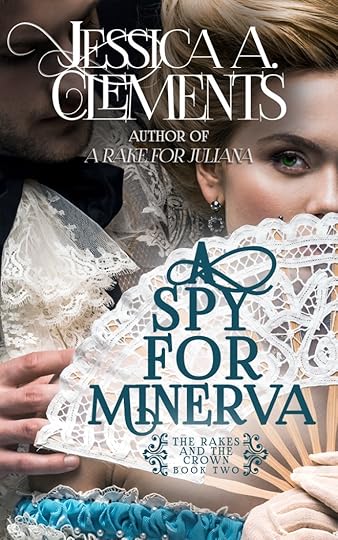
The Rakes and the Crown, book 2
After watching her parents die in a vicious carriage accident, Lady Minerva Hatfield knew that her life would change forever. She had trained since childhood to be a spy in the illustrious spy network, the Rakes of the Crown. But, with the Order on her heels, she has to hide — in plain sight — to save her life.
Lord Jacob Spencer, the Earl of Blackridge, has no clue that he has a spy living in his home. That is, until, his best friend married Lady Juliana Hatfield. Then out of the woodwork, literally, came Minerva — the identical twin sister of his friend’s new wife.
Will Jacob and Minerva’s past come between them? Will the Order agent succeed in killing her? And, will love conquer all?
Order now at: https://books2read.com/u/4DRJNr (Amazon link available 24 August)
ExcerptPrologue
Lady Minerva Hatfield, the younger daughter of the Earl of Dumbrey, was sitting opposite her parents in the family carriage. They were bound for the coastal county of Kent where their boat to France was waiting for them just off of Dover. She had been to the coast many times with her parents, but due to the conflict on the continent, she was not allowed to go on missions with them. She always stayed with her Uncle Basil for the several days that her parents were gone. This time, though, she was on her maiden mission with her father to gain information for the Crown.
To say she was excited was a true understatement. She was anxious, nervous, and fidgety beyond belief. She would put to work all she had been taught over the years. To say her education was slightly different from most girls (or even young men), was again, quite an understatement. Minerva and her twin sister Juliana grew up knowing their father was part of a spy ring for the Crown known as the Rakes. Normally, the title of “Rake” was passed from father to son, but in her father’s instance, it was father to daughter since there was no son.
Crack!
The sound woke Minerva from her daydreams. The sudden feeling of being weightless went through her as the carriage was overturned and threw its occupants around like rag dolls. Minerva could hear screams, but she was unsure whether they were her own or not. When the carriage finally came to a halt, the screams had faded, and all was eerily silent.
Minerva lay dazed, afraid to open her eyes. She wondered why her father hadn’t gotten up to make sure everyone was unharmed. The thought echoed through her mind. Maybe she should open her eyes, rub off the pain, and do what her father should be doing.
When she opened her eyes, the full scope of what had happened assaulted all of her senses. Her mother lay under her father, her neck cocked at an unnatural angle, her eyes sightlessly staring at her. Her father had the same look in his unseeing eyes. It took her a moment to realize what had happened to him. A large shard of glass from the carriage’s window had embedded itself in the back of his head.
She was alone. The horses were either dead, injured, or had run away. The driver was nowhere to be seen—this is, if he was even alive. She would have to be strong and find a way to make it back to London, to her sister. . .
Meet Jessica ClementsJessica Clements writes historical romances set during the US Civil War and the Regency Eras. When she’s not writing she is playing with her son, composing music, playing in a band, and working her day job.
One of the many things she and her son love to do is travel to new historical places. They have been to: Custer’s Battlefield, Saint Augustine, Savannah, and a couple of smaller battlefields in Alabama. They hope to be able to add to their list soon.
Website – https://www.jessicaanneclements.com/
Facebook – https://www.facebook.com/JessicaAClementsNavarro/
Twitter – https://twitter.com/jclementsauthor
BookBub – https://www.bookbub.com/authors/jessica-clements
Facebook Reader Group – https://www.facebook.com/groups/2497384330578831







August 26, 2021
Philanthropy and charitable causes in Regency England
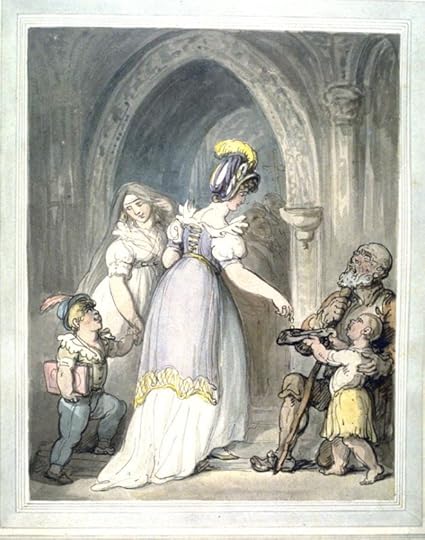
In the Regency, supporting charitable causes was a social obligation. For a start, it was a religious obligation, and parishes were one of the mechanisms through which people supported those in need. Owners of land and buildings were subject to a poor rate tax, collected and administered by the parishes. This funded the workhouses and other support to the poor of the parish. Your local minister would also present causes from the pulpit, or during visits to parishioners, and ask for support.
The involvement of the church was a legacy of medieval times, when institutionalised giving meant giving to the church, since the church ran the orphanages, hospitals, homes or other support for elderly pensioners, the medieval equivalent of soup kitchens, and so on and so on.
The dissolution of the monasteries removed the vast array of religious orders through which these many services to the poor were delivered. Nonetheless, the new Church of England did its best to pick up the strands, and certainly continued to collect tithes, donations and bequests.
Whereas Catholic doctrine had focused on the act of giving itself and the role it played in securing the donor’s immortal soul, Protestant teaching focussed far more on what was actually achieved with donations. This meant a new focus on understanding the actual issues of the day and trying to address their underlying causes. [Rhodri Davies, https://www.cafonline.org/about-us/blog-home/giving-thought/the-role-of-giving/the-history-of-civic-philanthropy-in-the-uk-what-can-we-learn ]
From the Middle Ages to the middle of the eighteenth century, church and state struggled ‘for control of the substantial financial resources involved in the act of giving’ [Sherwin, David, ‘The Great Charity Debate in Samuel Richardson’s Clarissa’, Journal of Church and State, 2000]
Slowly, the emphasis moved from supporting the church’s charitable ventures to supporting philanthropic ventures set up by a non-church organisation such as a guild, or by a group of interested people. And, while men fronted many of the organisation, an army of women made them work.
By the Regency era, the role of private philanthropic associations was firmly established. The characters in my books and those of the Bluestocking Belles who are actively involved in fund raising for good causes are firmly rooted in history. And The Ladies’ Society for the Care of the Widows and Orphans of Fallen Heroes and the Children of Wounded Veterans, which we invented for the Bluestocking Belles collection Frost Fair (and which some of our characters mock as The Society for Brats) would not be out of the ordinary in an age that gave us The Female Friendly Society for the Relief of Poor, Infirm, Aged Widows and Single Women of Good Character Who Have Seen Better Days.







August 24, 2021
Relatives on WIP Wednesday
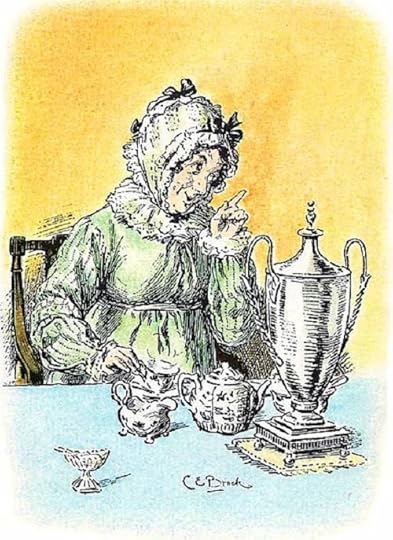
I do like writing about relationships within families. One can tell a lot about a character by looking at how they cope with the family they came from. This week’s WIP Wednesday is about relatives, and my excerpt is from the novella I’m writing for the next Bluestocking Belles’ box set.
Martin kept his scold till Doro had exclaimed her relief and left in their carriage, which Martin insisted on having prepared for her. Then Chloe had to listen to a long lecture on irresponsible behaviour, putting herself in danger, disobeying the head of her family whose responsibility it was to protect her, and (for good measure) keeping inappropriate pets.
She found it easy to promise to attend no more reform meetings. The one speaker she had heard had been disappointing, and while the riot had been an adventure, she did not need Martin to point out that she was lucky Lord Robin had been concerned enough to look for her. Indeed, his general and vague description of the harms that may have befallen her were nothing to the gruesome horrors she had imagined on her own.
He was still seething when they met for dinner, when Aunt Swithin distracted Martin’s attention by lamenting that she had missed the meeting. “I was so looking forward to it, dear Martin,” she told him, blissfully oblivious to his shocked horror, “but I suffered an upset to my digestion, so I told the girls to go ahead without me. Did you have an interesting time, Chloe?”
Chloe managed not to laugh, though after one glance at Martin’s face she had to keep her eyes on her plate. “I only heard the one speaker, Aunt Swithin. Mr Thomas, whose articles you liked so much when I read them to you. I’m afraid he writes much better than he speaks. After that the meeting broke up and Doro and I came home.”
Another swift glance at Martin almost overcame her gravity.
“Aunt Swithin? Are you telling me you approve of these revolutionaries? I cannot believe it. What would Uncle say?”
“Not revolutionaries, dear,” Aunt Swithin insisted. “I would never support revolution. Those poor dear children in France! But reform, yes. The government is trying to bully the people instead of listening, and it is not nice, dear. Nobody likes a bully.”
Martin opened his mouth and then closed it again. Chloe waited for him to scold Aunt Swithin as he had her, but instead, he changed the subject. “Chloe is expecting a gentleman caller tomorrow, Aunt Swithin. Lord Robert Finchley escorted Chloe home from the meeting, and asked to call again.”
“Finchley,” Aunt Swithin said, and then repeated it. “Finchley. Ah, yes. The Marquess of Pevenwood’s third son.” Aunt Swithin had taken her responsibilities as the female educator of a young viscount to include a devotion to memorising Debretts. She was also, even under the harsh rule of her husband, addicted to the gossip news sheets, entering into a conspiracy with Cook to read them in the kitchen when Uncle Swithin was out spreading gloom and virtue around the neighbourhood. She showed the fruits of that research in her next remark. “The one they call Lord Cuckoo, because everyone knows the Duke of Haverford laid him Pevenwood’s nest. A soldier, is he not? Does he wear a uniform? A man looks so delightful in a uniform. Does Lord Cuckoo have money, though, Chloe? One cannot imagine that Pevenwood left him any, under the circumstances.”
Poor Lord Robin. Chloe could do nothing about his tragic origins, but she could speak up for his to some degree. “Lord Robin—he prefers to be called Lord Robin, not Lord Robert,” and definitely not Lord Cuckoo, which sounded like a cruel schoolboy joke. “Lord Robin has left the army. I do not know what he plans for his future, nor do I know how much money he has. It is surely none of my business, Aunt Swithin.”
“Only if you wish to marry him, my dove. Money does not buy happiness, it is true. But one is able to be miserable in some degree of comfort. I always wished that Swithin had more money.”
“Aunt Swithin,” Martin protested. “Uncle Swithin was a very—” his pause for thought was telling. “Upright man,” he concluded.
“He never wore a uniform though,” Aunt Swithin complained. “I do love a man in a uniform.”







August 22, 2021
Tea with Eleanor: Paradise Lost Episode 17
 Chapter Eight
Chapter EightHaverford Castle, East Kent, November 1812
Eleanor was pleased to spend a few hours on her own. Haverford, having recovered his senses, was making up for lost time at some scandalous house party. Aldridge was in London, though he had not shared his reasons. Eleanor’s wards had accompanied her to Kent, but they had gone to stay with friends for a few days, even Frances, who at nearly fifteen was old enough to begin venturing into polite company in the more relaxed environment of the country.
She smiled at the escritoire that travelled from home to home with her. Hidden in its depths were the first booties she had ever knitted. And reknitted, multiple times, until she got it right. Matilda had worn them, and then Jessica.
Frances, though, was already out of infancy when she joined the Haverford household. There was never any doubt Eleanor would keep her, of course. She could not deny Jonathan and Aldridge; and besides, she fell in love with the little girl at first sight.
Haverford Castle, East Kent July 1806
The Duchess of Haverford examined her two sons as they waited for her to pour them a cup of tea each. To an outsider, they would seem totally at ease — Aldridge relaxed on the sofa, an amused twist to his lips and his cynical eyes fond as he teased his brother about the horse the boy had bought on a jaunt into Somerset; Jon laughing as he defended his purchase, suggesting warmly that the marquis’s eye for a filly blinded him to the virtues of a colt.
To their fond Mama, they appeared worried. Eleanor saw strain around the younger man’s eyes, and quick darting glances at her and then at his brother when Jon thought she wasn’t watching. Aldridge had that almost imperceptible air of being ready to leap to Jon’s defence in an instant; a watchfulness, a vague tension.
Aldridge’s cup was prepared as he liked it, and he came to fetch it from her hands, thanking her with a smile.
She would let them raise the subject, if that was their plan, but she did not intend to let them leave this room without knowing about the new addition to her nursery: a nervous withdrawn little girl of three or four years old. “If she was a bumptious little lordling and not a poor trembling mouse,” Nanny said, “she could be one of my lads come again. Same shaped face and eyes. Same colour hair with the curls that won’t brush out. Their lordships have your eyes, Your Grace, and this wee sprite doesn’t, but I’ll tell you who has eyes just that colour: so close to green as never so.” Not that Nanny did tell the duchess. She did not need to. Those eyes were more familiar to Eleanor than her own.
She handed a cup to the younger son of the man with those eyes.
The child came from Somerset. Jon had brought her home in his curricle, leaving his groom to ride Jon’s horse and manage the colt. On finding out about the little girl, and learning that Jon had deposited her in the nursery and then gone straight out to search town for his older brother, Eleanor had been tempted to question the groom.
However, she wanted Jon to tell her the story. Or Aldridge, perhaps. It was more likely to be his story than Jon’s, given the age of the child. Jon was only 19. Furthermore, it was in Somerset that a certain outrageous scandal blew up five years ago, resulting in the exile of the sons of two dukes: Aldridge to a remote Haverford estate in northern Scotland, and his accomplice overseas.
Nanny didn’t think the little girl was old enough to be a souvenir of Aldridge’s visit to the Somerset town, but her size might be a result of neglect. She had been half-starved, poor little mite. The bruises might be from falls or other childhood accidents. Nanny suspected beatings, which made Eleanor feel ill to think about.
She sat back with her own cup, and took a sip. As if it were a signal, Jon gave Aldridge another of those darting glances and spoke.
“Mama, I expect you’ve heard about Frances.”
Ah. Good. She was to be told the story. “Is that her name, Jon? Nanny didn’t know it, and little Frances isn’t talking.”
Jon nodded, and smiled. There was a sweetness to the boy that the elder never had, perhaps because he was a ducal heir from the moment of his birth. “She is a little shy, Mama.” His smile vanished and he frowned. “She has been badly used, and for no fault of her own. I could not leave her there, Mama. You must see that.”
Eleanor arched one brow, amusement colouring her voice as she answered. “If you tell me her story, my son, we will find out.”







August 21, 2021
Spotlight on Lord Maxwell’s Quest

Lord Maxwell Trent has never remained in one place for long. His fascination for history and quest for antiquities has taken him from Pompeii to Greece to Egypt, and now the search of an ancient sword has brought him to London—and back into Miss Rosemary Fairview’s orbit.
Miss Fairview has always valued her independence. Raised by travel-mad parents and fascinated by her mother’s archaeological journals, she knew that she’d never be content to settle into the dull life of running a household. When word of the lost sword brings Rosemary to London, she finds herself in pursuit of the same relic as her nemesis, Lord Maxwell Trent.
They know it’s impossible the sword once belonged to The Maid of Orléans. But that one sliver of hope, the what-if, propels them on the quest to discover the truth.
Danger stalks them from Mayfair’s drawing rooms to the maze of London’s rookeries. Can they work together to find the sword—and to survive? And will they realize that perhaps they shouldn’t have been competitors at all, but something more?
BUY LINKS:Amazon: https://www.amazon.com/gp/product/B099DFFLSC/ref=dbs_a_def_rwt_hsch_vapi_taft_p1_i0
iBooks: https://books.apple.com/us/book/id157...
Kobo: https://www.kobo.com/us/en/ebook/lord-maxwell-s-quest
BN/Nook: https://www.barnesandnoble.com/w/lord-maxwells-quest-jane-charles/1139848358?ean=2940162258087
EXCERPT:Partnering with Rosemary was an awful idea, and if he wouldn’t be distracted by worrying about her safety, Max would never have agreed to the proposition.
“You are going to be difficult, aren’t you?” she demanded as the hackney took them from Mayfair and into Whitechapel. The streets were busy tonight, which he found surprising given it wasn’t during the Season.
“I was more concerned with you being so,” he retorted.
“Yes, well, I have a plan to go about locating the sword.”
“As do I,” he informed her.
“How do you know that mine isn’t better?”
“How do you know that mine isn’t?” he countered.
“Oh, this is impossible.” She huffed and crossed her arms over her chest and stared out the window.
This might be the most difficult challenge he’d ever taken on. Not searching for the sword but working with a stubborn woman until it was located.
They said nothing further until the hackney pulled before the address of Madame LaFante.
After helping Rosemary onto the pavement, Max paid the driver then gathered their belongings and prayed it didn’t take them too long to find the sword.
Rosemary had marched ahead and rapped on the door. It was soon opened by a footman. “I’d like to see Madame LeFante,” she announced. “Lady Victoria Westbrook has sent me.”
“Us,” Max added as he stopped behind her.
The footman looked them over, then opened the door wider so that they could come inside.
“Would you please give her this?” Rosemary handed over the note to the footman, which he took, then disappeared down a corridor.
“I’d assumed bawdy houses were darker, or gauche,” Rosemary whispered.
“I’m certain she’s redecorated,” Max decided. Though, it could have been this bright then, not that anyone would have noticed after the sun set, the lamps lit, and rooms filled with men seeking intimacy for a short time. “We need to discuss this wisely and rationally.”
“I’m being very rational, and my plan is sound and sensible.”
“Why are you so confident?” he demanded.
“Because the women at Westbrook House helped me. They know the rookeries, and many were raised within and provided me with locations where someone might attempt to fence such an item or where I might overhear information, such as the tavern we’d both visited.”
He’d assumed she’d gone to her chamber and mapped out the best route to track the antiquity. Instead, she had questioned those familiar with the rookeries.
“I obtained my information from a better authority,” he informed her.
“Why do you always think you are right about everything? I find the women I spoke with highly informative and trust in their judgement.”
“Lady Victoria was correct.”
They turned to find an older woman, long after her prime, wrinkled, but still lovely and sharp.
“Her missive warned of the two of you bickering.”
“Yes, well, I apologize. It is not the best impression to leave,” Rosemary murmured.
Madame LeFante simply laughed.
“I hope you have two chambers that we might use for a short time. I don’t believe even a week will be necessary,” Rosemary explained.
“Two? No, I only have one.”
“Oh, that will never do,” Rosemary insisted.
“I’m afraid it must,” she insisted. “Come along. I’ll show you up.”
“We can’t share a chamber,” Max hissed. He’d thought having his own bed to sleep in would bring him at least some peace while undertaking this search with Rosemary.
This would be worse than that night in Jerusalem. He’d barely slept and was all too aware that she slumbered in his bed. Yes, Rosemary aggravated him to no end, but that didn’t change the fact that he found her desirable. So often he’d wanted to kiss her, simply so she’d cease arguing with him. At least, that was the excuse he made to himself, knowing it was a lie since there were several occasions when he’d wanted to kiss her, and not all of them were when they argued, such as when her eyes sparkled when she held an antiquity or she showed her enthusiasm during an excavation.
Blast! There was hardly ever a time that he didn’t want to kiss her for one reason or another, but he never would, for the same reason he’d not crawled into the bed in Jerusalem. She was an innocent miss no matter how worldly in her travels.
However, he’d never admit such to her, even if she were the one holding a knife to his throat because she’d never let him forget the admission.
“We aren’t even married,” Rosemary quickly objected.
“I recognize a married couple when I hear one.” Madame LeFante laughed again. “Besides, Lady Victoria introduced you as Mr. and Mrs. Milton Smythe, and that is who you are as long as you are here.”
Bloody hell.
MEET JANE CHARLES USA Today bestselling author Jane Charles is a prolific writer of over fifty historical and contemporary romance novels. Her love of research lends authenticity to her Regency romances, and her experience directing theatre productions helps her craft beautiful, touching stories that tug at the heartstrings. Jane is an upbeat and positive author dedicated to giving her characters happy-ever-afters and leaving the readers satisfied at the end of an emotional journey. Lifelong Cubs fan, world traveler and mother of three amazing children, Jane lives in Central Illinois with her husband, two dogs and a cat. She is currently writing her next book and planning her dream trip to England. Be sure to join Jane in her private reader group Romance & Rosé: https://www.facebook.com/groups/romanceandrose
USA Today bestselling author Jane Charles is a prolific writer of over fifty historical and contemporary romance novels. Her love of research lends authenticity to her Regency romances, and her experience directing theatre productions helps her craft beautiful, touching stories that tug at the heartstrings. Jane is an upbeat and positive author dedicated to giving her characters happy-ever-afters and leaving the readers satisfied at the end of an emotional journey. Lifelong Cubs fan, world traveler and mother of three amazing children, Jane lives in Central Illinois with her husband, two dogs and a cat. She is currently writing her next book and planning her dream trip to England. Be sure to join Jane in her private reader group Romance & Rosé: https://www.facebook.com/groups/romanceandrose
https://janecharlesauthor.com (website and newsletter)
https://twitter.com/JaneAcharles
https://www.facebook.com/JaneCharlesAuthor
https://www.pinterest.com/JaneAcharles/
https://www.goodreads.com/author/show/4879172.Jane_Charles







August 19, 2021
The Rakehell in Fact and Fiction
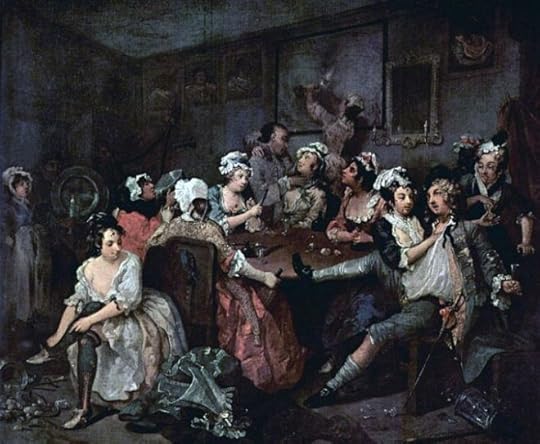
A Rake’s Progress, Hogarth (1732-33). This progress was a series of eight paintings by William Hogarth showing the decline and fall of a man who wastes his money on luxurious living, sex, and gambling.
In modern historical romantic fiction, the hero is often described as a rake. Frequently, he has the reputation but not the behaviour. He is either misunderstood, or he is deliberately hiding his true nature under a mask, perhaps for reasons of state.
Even the genuine player is not what they would have called a rakehell back in the day. He cats around, sleeping with multiple lovers (either sequentially or concurrently) or keeping a series of mistresses, or both. But when he falls in love with the heroine he puts all of that behind him, and—after undergoing various trials—becomes a faithful husband and devoted family man.
Yesterday’s rakehell was a sexual predator

John Wilmot, 2nd Earl of Rochester was part of the Merry Gang, the original Restoration rakes who surrounded Charles II. He is known for his lovers, his poetry, his profligate behavior, and an unending stream of scandal. He is said to have been constantly drunk for five years, and died at only 33 years of age.
The Georgian and Regency rakehell was a far less benign figure. Back then, a rakehell was defined as a person who was lewd, debauched, and womanising. Rakes gambled, partied and drank hard, and they pursued their pleasures with cold calculation. To earn the name of rake or rakehell meant doing something outrageous—seducing innocents, conducting orgies in public, waving a public flag of corrupt behaviour under the noses of the keepers of moral outrage. For example, two of those who defined the term back in Restoration England simulated sex with one another while preaching naked to the crowd from an alehouse balcony.
Then, as now, rakes were self-centred narcissists who acknowledged no moral code, and no external restraint either. Their position in Society and their wealth meant they could ignore the law, and they didn’t care about public opinion. What they wanted, they took. A French tourist, writing towards the end of the 19th century said:
“What a character! How very English! . . . Unyielding pride, the desire to subjugate others, the provocative love of battle, the need for ascendency, these are his predominant features. Sensuality is but of secondary importance. . . In France libertines were frivolous fellows, whereas here they were mean brutes. . .”
Real rakehells were sexual predators and morally bankrupt, seducing innocents and partying their estates into debt and themselves into early graves. Not at all befitting a romantic hero!
Most 18th and early 19th century aristocrats (1700 to 1830) would not have called themselves rakes

Francis Dashwood, 11th Baron le Despencer, fount time between his political duties and his promiscuous sexual activities to found and run the Hellfire Club, whose members included some of the most powerful men of the day. They gathered to share their interests: sex, drink, food, dressing up, politics, blasphemy, and the occult.
Historians have commented that we see the long Georgian century through the lens of the Victorian era, and our impressions about moral behaviour are coloured by Victorian attitudes. The Georgians expected men to be sexually active, and where women were concerned, they worked on the philosophy that if no one knew about it, it wasn’t happening. If visiting brothels, taking a lover, or keeping a mistress, was all it took to be defined as a rake, most of the male half of Polite Society would be so called. And a fair percentage of the female half.
Drunkenness certainly didn’t make a man a rake—the consumption of alcohol recorded in diaries of the time is staggering. (Even taking into account that both glasses and bottles were smaller.) Fornication and adultery weren’t enough either, at least when conducted with a modicum of discretion (which meant in private or, if in public, then with other people who were doing the same thing).
In the late 18th and early 19th century, one in five women in London earned their living from the sex trade, guide books to the charms, locations, and prices of various sex workers were best-selling publications, men vied for the attention of the reigning courtesans of the day and of leading actresses, and both men and women chose their spouses for pedigree and social advantage then sought love elsewhere. The number of children born out of wedlock rose from four in 100 to seven (and dropped again in the Victorian). And many women had children who looked suspiciously unlike their husbands.
The more things change, the more they remain the same
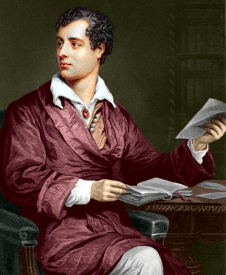
Lord Byron. Described as mad, bad, and dangerous to know, Byron was admired for his poetry and derided for his lifestyle. When a series of love affairs turned sour, he married, but within a year his wife could no longer take his drinking, increased debt, and lustful ways (with men and women).
Some of today’s sports and entertainment stars, and spoilt sons of the wealthy, certainly deserve to be called rakehells in the original sense of the word. And just as the posted videos and images of today show how much the serial conquests are about showing off to the rake’s mates, the betting books that are often a feature of historical romances performed the same function back then.
Given access to social media, yesterday’s rakehell would be on Tinder.
Lord Byron earned the appellation ‘rake’ with many sexual escapades, including—so rumour had it—an affair with his sister. His drinking and gambling didn’t help, either. But none of these would have been particularly notable if they had not been carried out in public.
The Italian adventurer Giacomo Casanova mixed in the highest circles, and did not become notorious until he wrote the story of his life.
On the other hand, William Cavendish, 5th Duke of Devonshire, lived with his wife and his mistress, who was his wife’s best friend. The three did not share the details of their relationship with the wider world, so there was gossip, but not condemnation. Devonshire is also rumoured to have been one of Lady Jersey’s lovers (the mother of the Lady Jersey of Almack fame). He was not, at the time, regarded as a rake.
(This is an update of a post I wrote in 2016, when I published A Baron for Becky, in which an actual rake hires a mistress, falls in love with her, falls out of love with her, and arranges for her to marry his best friend. This year, I’m publishing the book in which he finally is the romantic hero.)
Also see a couple of posts on some of the consequences of the lifestyle:
Syphylis. Zoonotic disease or the New World’s revenge?Counting the bastardsCelebrating To Tame the Wild Rake
Details of the first contest will be posted here on Tuesday 24th August.







August 17, 2021
Pets on WIP Wednesday
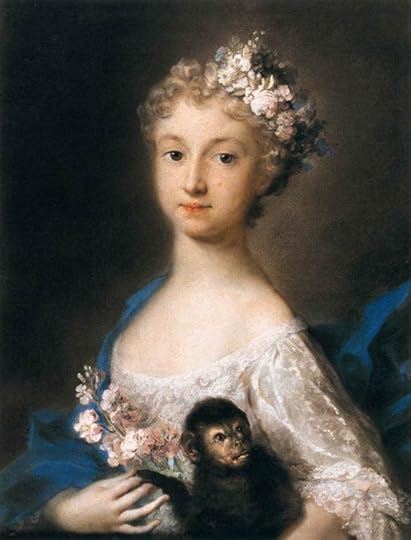
Or perhaps animal companions is a better word, since if you want to share an excerpt in the comments, any animal is welcome. Mine is from the new story I’m writing for the next Bluestocking Belles collection.
The monkey did not want to stay in the basket. Chloe had to hold down the lid while pretending that nothing untoward was happening, and keeping an expression of polite interest on her face to convince those around her that she was listening to the speaker.
She didn’t dare look at Doro. Her friend had her eyes focused forward with a determination belied by her dancing eyes and the occasional tremble of her lips. If they met one another’s eyes, they would collapse into giggles as if they were twelve or thirteen again, and sharing a schoolroom.
Chloe needed to not think about Rosario the monkey or Doro’s amusement. Which meant, of course, that was all she could think about. The lecture might have helped, but the man currently currently droning on about the iniquities of the Habeas Corpus Act was too boring to actually make any sense.
The lid kicked under her hand. She bent over to rap it with her knuckles, just as the audience started clapping. The sudden roar of sound, of course, made Pepper even more desperate to get out of the basket.
Doro leaned closer and hissed out of the side of her mouth, “I did suggest the reform meeting might not be the best place for a monkey.”
“I couldn’t leave him behind,” Chloe protested. “Martin threatened to wring his neck when he caught him.”
Doro’s amusement bubbled out in a gurgle. “Rosario did steal Lord Tavistock’s cravat pin,” she pointed out.
It was true, but not the whole truth. In the two weeks since Chloe rescued Rosario from a mob of villagers, she had stolen several things a day, bringing them all to Chloe with every expectation of approval.
The villagers had told Martin, Chloe’s brother, the Viscount Tavistock, that the original owner was in prison awaiting trial for theft.
A cravat pin, two pair of cuff links, a cross belonging to cook, a pair of Chloe’s earrings, one jewelled buckle from a shoe, and a handful of other small objects witnessed to the thief’s small hairy accomplice.
“He will calm down by the time I am home,” Chloe assured Doro, hoping it was true.
The next speaker had risen, and someone behind demanded that the ladies be silent. Chloe looked around and winced an apology at the large man glaring from the next row of seats.
Two rows behind him, a fair-haired gentleman caught her gaze and winked one twinkling hazel eye.
The speaker, a little man with a bristling beard and burning eyes, began his oration. Boredom was not going to be an issue. A voice that was surely too large for the man’s body boomed through the room, calling for them to protest the iniquities under which the workers suffered. “I love the King as much as anyone,” he claimed, at full shout, “but his son plays at building pleasure palaces while his government oppresses his people and drives us into the workhouse.”
At the man’s rant, Rosario threw herself against the lid with renewed determination, so that the basket rocked despite Chloe’s attempt to keep it still.
Behind them, someone booed. The speaker shouted him down, but a jeer came from another corner. Then the first missile flew, straight past Chloe’s head.
Chloe ducked and lost hold of the lid of the basket. Rosario shot out, into the crowd, yabbering her distress.







August 15, 2021
Tea with Eleanor: Paradise Lost Episode 16

Eleanor turned. Behind her, a lady as exotic as her garden stood on the steps of a pavilion, raised to give a sheltered place from which to enjoy a view over the garden. “I am asleep and dreaming, I think,” the lady said, “for it is afternoon by the sun, and at such a time my garden is full of my children and my ladies.” She waved to indicate the deserted space, her lips gently curved and her face alight. “We should enjoy the peace while it lasts. Will you join me for coffee, or perhaps tea?”
Eleanor nodded and mounted the stairs to join her, following her into a space as alien as the garden, the stone-paved floor almost invisible under brightly coloured rugs and cushions. “Is it your dream or mine? For when I went to sleep, I was in Haverford House, in London. And this is not England.”
The lady raised both brows, and then let them drop, her face suddenly bland. “You are, perhaps, the Duchess of Haverford?”
“Forgive me, I should have introduced myself. Yes, I am Eleanor Haverford.”
If Eleanor had any doubts that this was a dream they were dispelled in the next instant, when a small table appeared from thin air, laden with a tea pot, a long full-bellied coffee pot, two cups, and plates of small delicacies.
The lady gave a brief huff of amusement. “The dream reminds me of my manners. Please be seated, duchess. Your Grace, is it not? I am Mahzad.”
Now it was Eleanor’s turn to wipe all expression from her face as she inclined her head. “Your majesty. Is that the correct form of address? Cecily McInnes spoke of you when she returned to England.”
“Please call me Mahzad. After all, we have a lot in common, you and I. Tea? Or coffee?”
“Coffee, and please call me Eleanor. Cecily said he was well, and very much in love with his wife.” And Eleanor was happy for the man she had once loved with a maiden’s ardent passion. Of course, she was.
Mahzad smiled and placed a protective hand over her belly, where a slight rounding indicated yet another child on the way to join the already large family. “You have a generous heart, Eleanor. You have not been as fortunate as James and I; I think.”
Eleanor waved away the sympathy. “I have my children and my work. I am content. But tell me about your family. Who knows how long the dream might last, and I wish to know all about them.”
Haverford House, London, July 1812
It was her imagination, of course, building on the stories that Cecily had told, and Grace and Georgie before her. But the following morning, Eleanor had found a newly unfurled rose in the castle gardens that was the precise shade of the roses in one part of Mahzad’s garden.
Now, it was fragile, dried and faded, adorned with yet another tear to join all the others she had wept on it in the past eighteen years. James had loved his wife, but he had loved her first. He had assured her that he had fully intended to come home and claim her, but that his father denied to pay his ransom, despite his captor’s threat to execute him without it.
To add insult to injury, Winshire had told James that Eleanor was already married to Haverford. It was true, but only because Winshire and Eleanor’s father had assured her that James was dead.
Eleanor gently laid the flower back into the box. Once, she had loved and been loved. That, at least, would never change.







August 12, 2021
The Tiffany effect: strong-minded women, medical hygiene, and other ways truth is stranger than fiction

I read the reviews of my books, though most pundits advise authors never to do that. A good review can give me a lift for days. I’m grateful for the ones that pick up a mistake (such as the fact that To Wed a Proper Lady still has chapter 22 and 23 transposed even though I loaded a new file for it months ago–will fix again! And check afterwards to see if it is right.) And people who just don’t like the kind of books I write don’t bother me. There’s stuff I don’t like, too, and I can only wish them happy reading.
Modern names that aren’tEvery now and then, though, there’s a review I steam over. The only ones that upset me are examples of what has been called the Tiffany Effect. The Tiffany Effect is named after the idea that Tiffany is a modern name, when it was common in the thirteenth century and achieved the modern spelling in the seventeenth. Here’s more about the Tiffany Effect and other names that seem modern but have actually been around for a while.
Strong-minded and independent women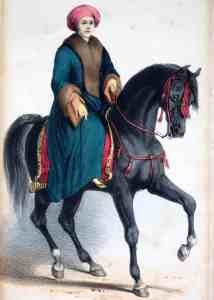
Lady Hester Stanhope was a famous woman explorer.
Another idea I hear quite a bit is that my women are too strong-minded for the Regency era. Really? It is, of course, true that the dominant (male) opinion of women in Regency times saw them as adjuncts to their husbands; meek creatures who needed to be protected from the harsh realities of life, and who did not have a thought their husbands didn’t put there. Women lacked the physical strength or mental capacity, so such men said, to understand anything outside of the domestic sphere. Some women undoubtedly accepted their assigned role. Some did not.
Here’s an article about Regency business women, including the owners of two highly successful banks. And here’s another about Georgian and early Victorian women who didn’t so much as break the mould as refuse to even get into it. And yes, a woman — or at least a lady — who refused to conform faced consequences. How serious those were depended on how much power she held. If she was wealthy and single or a widow, or if her marriage settlement gave her control of her own finances, people might gossip behind her back, but that would be it.
Those further down the social scale faced less of a barrier to independence, at least in terms of income-earning. Women still commonly worked alongside their men in the family trade, though this would change in more successful merchant families in the Victorian era. And women, since they were cheaper than men, filled many positions that required deftness rather than strength in industries as diverse as cotton mills, mines, and china painting.
Marriage as a bad life-choice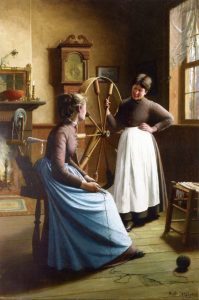 Many people believe that, in the past, marriage was the only option for women, and that unmarried women were to be pitied. Certainly, men wrote this way during the Regency era, and especially in the Victorian era that followed. I write romance, so marriage tends to be on the table as reasonable choice. But research suggests one third of all women never married. Shortage of men during the Napoleonic Wars might be one reason. Loss of independence and the risks of childbirth were right up there, too, as I’ve written in an earlier post. And the frequent incidence of two close female friends who set up house together and are fond companions may well include many platonic relationships, but we have some rather frank diaries that witness to what today would be same-sex marriages.
Many people believe that, in the past, marriage was the only option for women, and that unmarried women were to be pitied. Certainly, men wrote this way during the Regency era, and especially in the Victorian era that followed. I write romance, so marriage tends to be on the table as reasonable choice. But research suggests one third of all women never married. Shortage of men during the Napoleonic Wars might be one reason. Loss of independence and the risks of childbirth were right up there, too, as I’ve written in an earlier post. And the frequent incidence of two close female friends who set up house together and are fond companions may well include many platonic relationships, but we have some rather frank diaries that witness to what today would be same-sex marriages.
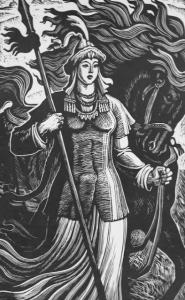
Kyz Saikal, a woman warrior from Turkish history, as featured on a Turkish stamp
The Victorian era, was also responsible for removing the glamour of woman as warrior.
Women played an important role in the British military, performing a wide range of services until the mid-nineteenth century. In the eighteenth-century stories, songs and ballads about female soldiers — women who in real life dressed as their male counterparts to go to war or sea — enjoyed an enormous popularity and serve to challenge our contemporary notion that Florence Nightingale was the first woman to work in a modern combat situation. The Amazons’ stories, however, changed over time and by the nineteenth century had to be sanitized to conform to a more genteel and fixed concept of femininity. Gender had increasingly become identified as a biological entity rather than a social and external construction. Thus the female soldiers came to be regarded as aberrations of nature rather than slightly risqué heroines and military historians rewrote earlier armies into all-male institutions. [Julia Wheelwright. “Amazons and Military Maids” in Women’s Studies International Forum: Volume 10, Issue 5, 1987, Pages 489-502]
As for military sports, archery was popular with both genders, and we have evidence of women fencers in the Georgian and the Victorian eras, so presumably in the Regency too. The participants were ladies, who had the leisure for such sports. Women boxers were of the lower sort, but a popular drawcard. My own women warriors are outliers, being foreign-born, in an imaginary Central Asian kingdom headed by a non-traditional woman and her supportive husband. Iran and Central Asia have an ancient tradition of female warriors, which certainly would have been legendary by the end of the eighteenth century, when my Mahzad was kagana in Para-Daisa Vada, east of the Caspian Sea. But Mahzad had the stories there to build on as she raised her own daughters and their female bodyguards.
Healers and hygiene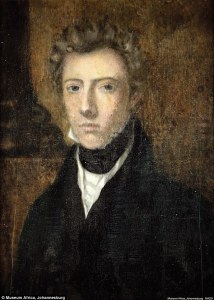
Dr James Barry trained in Edinburgh, performed the first Caesarian in which both woman and child lived in around 1820, and was discovered to be a woman after his/her death in 1860.
A recent review assured the world that my female healer in To Mend the Broken-Hearted was anachronistic in her insistence on cleanliness in her sick room. The reviewer claimed special knowledge because of her profession, and pointed out that the relationship between hygiene and patient health depended on developing a germ theory of health, and even after that, was established only with great difficulty between the end of the nineteenth century and first part of the twentieth century. Which is true, as far as received wisdom passed on in the medical training of Western physicians. It is an incomplete truth, however. Established medicine fought vigorously to resist the idea that doctors were killing their patients by refusing to wash their hands.
But as early as the mid eighteenth century, James Lind (the same man who introduced citrus fruit to naval vessels to reduce scurvy) observed that patients in clean sickrooms were more likely to get well than patients in dirty conditions. He later practiced as a physician in Edinburgh, and Edinburgh-trained doctors have been prominent in the history of medical hygiene. I’ve mentioned Alexander Graham, another Edinburg man, in my article on hand-washing and puerperal fever. Doctors continued to resist the idea that they carried disease from sick people to the birthing chamber for a long time after Graham proposed it.
Meanwhile, though, the navy continued Lind’s prescription of clean sickrooms, and a number of others practiced cleanliness as part of the more general idea of disinfection, a custom that goes back to at least the Greeks, if not earlier. Without a proper theory of the causes of illness, our ancestors could still see that cleanliness and disinfection made a difference.
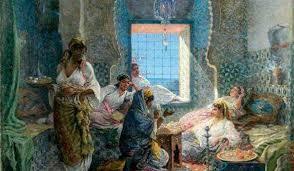
The practice of keeping women sequestered in their own quarters made medical practice by women essential in the Eastern world.
Add to this, my female healer was trained in Persian and Arabic medical practice. Persian treatises on cleanliness in the sickroom go back into ancient history. The holy texts of both Islam and Judaism command hygiene as a response to illness.
Islamic medicine developed further through many translations from the East and West in the Abbasid Period. Muslim and non-Muslim physicians combined early Indian and Greek medicine and systemised it further. Some works during this period are devoted to hygiene (hifz al-sihha), while the maintenance of health is included in general medical books as well. For example, Ibn Sīnā (or Avicenna; d. 1037) discussed hygiene in his Canon of Medicine (Al-Qānûn fi’t-tıb). In his system of medicine, medical practice was combined with physical and psychological factors, drugs and diets — or “holistic” medicine. [Hakan Coruh, Theology, Health, and Hygiene]
My reviewer’s knowledge of the history of her profession is undoubtedly excellent, but only as far as it relates to main-stream Western medical training in the past 150 years.
Another reviewer was scathing about my villainous vicar’s misappropriation of funds in Lord Calne’s Christmas Ruby. The bishop gets the tithe, not the rector, she said. In the Regency era, the tithes went straight to the rector, and there was such abuse of the system that it led to legislation a few years later. I’ve written about the regency system here.
Sucking it upAh well. If I’m going to continue resisting the whole author’s note idea, I suppose I’m going to see more reviews where I’m wrongly accused of poor research. And I’m still not intending to have a character called Tiffany, because truth is stranger than fiction.










